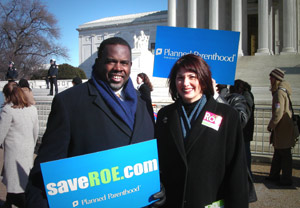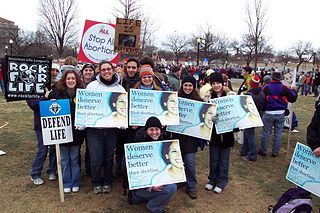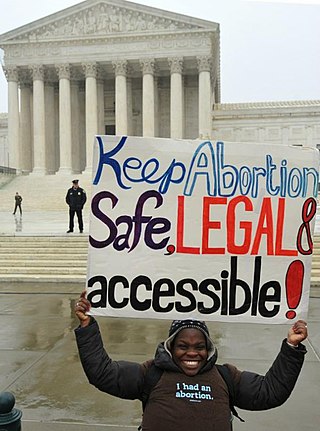Related Research Articles
Roe v. Wade, 410 U.S. 113 (1973), was a landmark decision of the U.S. Supreme Court in which the Court ruled that the Constitution of the United States generally protected a right to have an abortion. The decision struck down many abortion laws, and caused an ongoing abortion debate in the United States about whether, or to what extent, abortion should be legal, who should decide the legality of abortion, and what the role of moral and religious views in the political sphere should be. The decision also shaped debate concerning which methods the Supreme Court should use in constitutional adjudication. The Supreme Court overruled Roe in 2022, ending the constitutional right to abortion.

The United States abortion-rights movement is a sociopolitical movement in the United States supporting the view that a woman should have the legal right to an elective abortion, meaning the right to terminate her pregnancy, and is part of a broader global abortion-rights movement. The movement consists of a variety of organizations, with no single centralized decision-making body.

In the United States, abortion is a divisive issue in politics and culture wars, though a majority of Americans support access to abortion. Abortion laws vary widely from state to state.
Reproductive rights are legal rights and freedoms relating to reproduction and reproductive health that vary amongst countries around the world. The World Health Organization defines reproductive rights as follows:
Reproductive rights rest on the recognition of the basic right of all couples and individuals to decide freely and responsibly the number, spacing and timing of their children and to have the information and means to do so, and the right to attain the highest standard of sexual and reproductive health. They also include the right of all to make decisions concerning reproduction free of discrimination, coercion and violence.

The United Statesanti-abortion movement is a movement in the United States that opposes induced abortion and advocates for the protection of fetal life. Advocates support legal prohibition or restriction on ethical, moral, or religious grounds, arguing that human life begins at conception and that the human zygote, embryo or fetus is a person and therefore has a right to life. The anti-abortion movement includes a variety of organizations, with no single centralized decision-making body. There are diverse arguments and rationales for the anti-abortion stance. Some allow for some permissible abortions, including therapeutic abortions, in exceptional circumstances such as incest, rape, severe fetal defects, or when the woman's health is at risk.
The Religious Coalition for Reproductive Choice (RCRC) is an abortion rights organization founded in 1973 by clergy and lay leaders from mainline denominations and faith traditions to create an interfaith organization following Roe v. Wade, the 1973 U.S. Supreme Court decision legalizing abortion in the U.S. In 1993, the original name – the Religious Coalition for Abortion Rights (RCAR) – was changed to the Religious Coalition for Reproductive Choice.
The Chicago Women's Liberation Union (CWLU) was an American feminist organization founded in 1969 at a conference in Palatine, Illinois.

The National Organization for Women (NOW) is an American feminist organization. Founded in 1966, it is legally a 501(c)(4) social welfare organization. The organization consists of 550 chapters in all 50 U.S. states and in Washington, D.C. It is the largest feminist organization in the United States with around 500,000 members. NOW is regarded as one of the main liberal feminist organizations in the US, and primarily lobbies for gender equality within the existing political system. NOW campaigns for constitutional equality, economic justice, reproductive rights, LGBTQIA+ rights and racial justice, and against violence against women.

Reproductive justice is a critical feminist framework that was invented as a response to United States reproductive politics. The three core values of reproductive justice are the right to have a child, the right to not have a child, and the right to parent a child or children in safe and healthy environments. The framework moves women's reproductive rights past a legal and political debate to incorporate the economic, social, and health factors that impact women's reproductive choices and decision-making ability.

Merle Hoffman is an American journalist and activist.

Ipas is an international, non-governmental organization that seeks to increase access to safe abortions and contraception. To this end the organization informs women how to obtain safe and legal abortions and trains relevant partners in Africa, Asia, and Latin America on how to provide and advocate for these.

Founded in 1987, Lifewatch, Taskforce of United Methodists on Abortion and Sexuality (TUMAS) is a 501(c)(3) organization that serves as the unofficial anti-abortion group within the United Methodist Church (UMC). The organization publishes a quarterly newsletter titled Lifewatch and is a member of the National Pro-Life Religious Council. The organization also frequently holds seminars to address within Methodist Christianity the theological, moral, and social aspects of defending women and their unborn children from abortion. It is committed to reversing the Roe v. Wade decision "by first providing theological leadership within the church, which will set an example that political, legal and cultural forces will follow."
The Feminist Abortion Network (FAN) is a national consortium of independent, feminist, not-for-profit abortion care providers. Although more than fifty such health care providers once existed, today fourteen clinics remain in operation. FAN was formed in 2006 to promote information-sharing, cross-organizational strategizing and improve the overall efficacy and reach of the member clinics.

Abortion-rights movements are movements that advocate for legal access to induced abortion services, including elective abortion. They seek to represent and support women who wish to terminate their pregnancy without fear of legal or social backlash. These movements are in direct opposition to anti-abortion movements.
African Americans', or Black Americans', access and use of birth control are central to many social, political, cultural and economic issues in the United States. Birth control policies in place during American slavery and the Jim Crow era highly influenced Black attitudes toward reproductive management methods. Other factors include African-American attitudes towards family, sex and reproduction, religious views, social support structures, black culture, and movements towards bodily autonomy.
The SisterSong Women of Color Reproductive Justice Collective, also known as SisterSong, is a national activist organization dedicated to reproductive justice for women of color.
Abortion in Alabama is illegal. Historically, Alabama's abortion laws have evolved from strict regulations in the late 19th and early 20th centuries to a period of liberalization following the landmark 1973 Supreme Court decision in Roe v. Wade, which legalized abortion nationwide. However, Alabama has consistently enacted legislation aimed at restricting access to abortion.
Abortion in California is legal up to the point of fetal viability. An abortion ban was in place by 1900, and by 1950, it was a criminal offense for a woman to have an abortion. In 1962, the American Law Institute published their model penal code, as it applied to abortions, with three circumstances where they believed a physician could justifiably perform an abortion, and California adopted a version of this code. In 2002, the California State Legislature passed a law guaranteeing women the right to have an abortion "prior to viability of the fetus, or when the abortion is necessary to protect the life or health of the woman". In 2022, California voters overwhelmingly approved Proposition 1, which amended the Constitution of California to explicitly protect the right to abortion and contraception by a margin of 33.76%.
Abortion in Maryland is legal at all stages of pregnancy. The first laws regulating abortion in the state were passed in 1867 and 1868, banning abortion except by a physician to "secure the safety of the mother." Abortion providers continued to operate both within and outside of the law. Legal enforcement became more strict from the 1940s through 60s, with numerous police raids on abortion providers. In 1968, Maryland passed a liberalized abortion law that clarified the wording of the previous law, allowing abortion in hospital settings in cases of rape, severe fetal deformity, or when life and health were endangered.

The National Mobilization for Reproductive Justice (NMRJ) is a coalition of grassroots organizations and unions supporting reproductive rights, particularly after the 2022 overturn of Roe v. Wade in the United States. The coalition was initiated by Radical Women in August 2021 and has local committees throughout the US. It is currently focusing on an effort to get the AFL-CIO to organize a national emergency labor conference to build defense of reproductive justice.
References
- ↑ Schultz, Jeffrey D.; Van Assendelft, Laura A. (1999). Encyclopedia of women in American politics. The American political landscape (1 ed.). Greenwood Publishing Group. p. 195. ISBN 1-57356-131-2.
- ↑ Rover, Julie (April 13, 2011). "Planned Parenthood: A Thorn In Abortion Foes' Sides". NPR. Retrieved November 5, 2015.
- ↑ Walsh, Joan (3 March 2020). "Emily's List Has Endorsed Warren—but Will Anyone Hear About It?". The Nation. Retrieved 10 March 2020.
- ↑ Tso, Tiffany Diane (May 22, 2019). ""It's About Free Will": 3 Conservative Women On Why They're Pro-Choice". Refinery29. Retrieved 10 March 2020.
- ↑ Schreiber, Ronnee (2008). Righting Feminism: Conservative Women and American Politics . Oxford University Press, Inc. pp. 23. ISBN 978-0-19-533181-3.
- ↑ Faxneld, Per (April 2, 2013). "Intuitive, Receptive, Dark": Negotiations of Femininity in the Contemporary Satanic and Left-hand Path Milieu". International Journal for the Study of New Religions. 10 (2): 216 – via Equinox Publishing Ltd.
- ↑ "National Mobilization for Reproductive Justice".